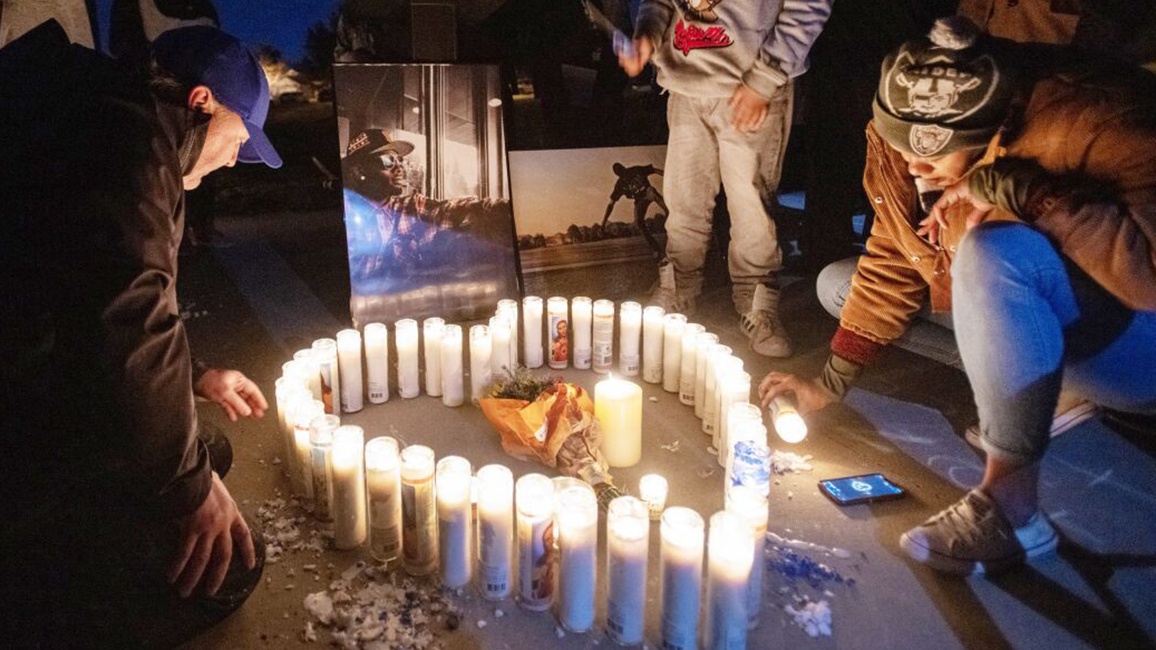They Should Be Alive

A memorial for Tyre Nichols. (Photo/Sacramento Bee)
As United Methodists, we must unequivocally denounce police brutality and work toward a meaningful reconstruction of our institutions
Rev. Bryant X. Phelps is senior pastor at Church of the Disciple in DeSoto, Texas.
Philando Castile, Breonna Taylor, George Floyd, Atatiana Jefferson and Tyre Nichols should be alive. Their names are among thousands of Black people killed extrajudicially by police officers in America.
On Jan. 7, 2023, Memphis police officers pulled Tyre Nichols over for reckless driving. After attempting to flee the scene for fear of his life, he was unconscionably beaten by five police officers. Nichols, a father, photographer and lover of life, died three days later from his injuries. As United Methodists, we must reaffirm our baptismal vows to “renounce evil in whatever ways they present themselves” and live it out through legislation, protests and teach-ins. We must unequivocally denounce police brutality and work toward a meaningful reconstruction of our institutions that enables human flourishing.
Jill Lepore, in her 2020 New Yorker article “The Invention of the Police,” suggested that “the crisis in policing is the culmination of a thousand other failures — failures of education, social services, public health, gun regulation, criminal justice and economic development.” As people of faith, we must interrogate institutions and examine them critically.
In his 1967 book, Where Do We Go from Here? Chaos or Community, Dr. Martin Luther King, Jr. suggests that America’s institutions are built upon a moral failure that is best understood as “racism, classism, and militarism.” To celebrate King and to follow Jesus at all requires that we champion, what Dr. King called in his testimony before Congress in 1968, “a restructuring of American society.”
By no means should we dismiss police without moral consciousness as “bad cops” because of the historical roots of policing in America. Neither should we discourage a system that holds us accountable to each other according to a high moral standard. Rather we must understand that the framework we live within warrants restructuring because it exists at the expense of Black, brown, LGBTQIA+, differently abled and non-white lives. Our institutions uphold otherization such that success requires the acceptance of human devaluation. If it were not so, Black men would not have understood excessive force (militarism as a tool of white supremacy) as the ultimate measure of successful policing.
We must not forget that at the genesis of this nation’s institutions is a burgeoning religious movement called “Methodism.” To be Methodist at all, there must lie a deep awareness of our interconnectedness with the formalization of America’s systems. At times, this movement has done what it must to inspire social change, but too often has this way appropriated the toxicities of this nation’s moral failures to the degree that – at times – it has been hard to identify our church as a prophetic voice or a systematic accomplice.
If our institutions are to change, we must be the church the world needs and be unafraid to proclaim a moral revival, name immoral evils, inspire a communal restructuring and proclaim (provide) the tenets of God’s beloved community on earth as it is in Heaven. To “do no harm, do good and stay in love with God” is to be more like Christ.
Tyre Nichols, and thousands more, should be alive. If Black lives are to be preserved and celebrated, it will be because those of us under the “lordship of Jesus Christ” are daring enough to be like Christ.
In the Gospels, as Jesus enters Jerusalem, both a satellite of power for the Roman empire and the holy site for the people of God, he first visits the temple. When he enters the temple, he began to flip tables and proclaimed that “the house of prayer has become a den of thieves.” What Jesus does in the temple is the prototype for restructuring systems that diminish human flourishing.
To be the temple, or beloved community, requires that we begin flipping tables where the bodies of Black, brown and remaining otherized people have been diminished. To practice an open table encourages tough conversations, embraces accountability and orders our lives for human flourishing. No other names should ever be listed on America’s exhaustive list of those who have been lynched and immortalized as “strange fruit” because of our failure to act.
May it be so that we do not wait, because if we do, our prophetic voice and plans will wither, our church will lose its relevancy and more names will be added.
Published: Thursday, February 23, 2023
